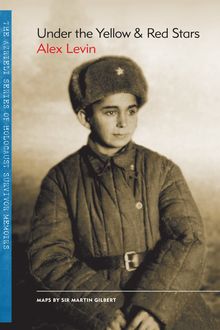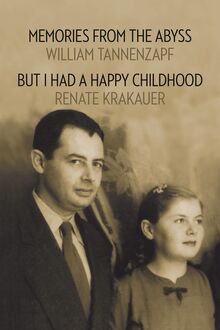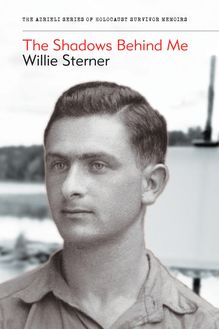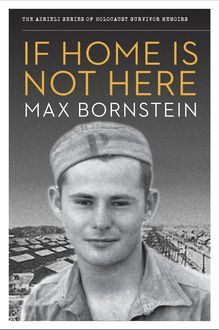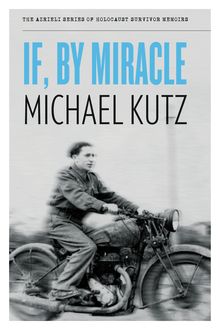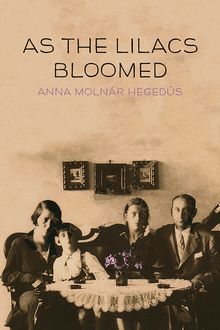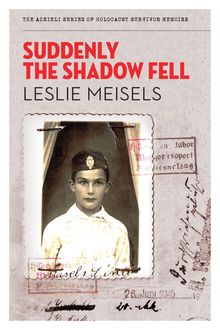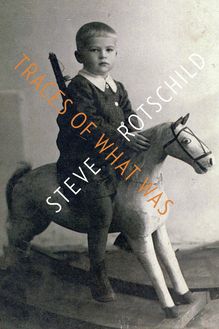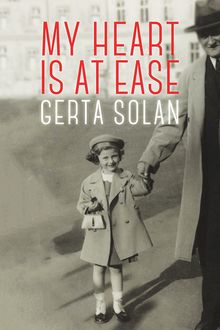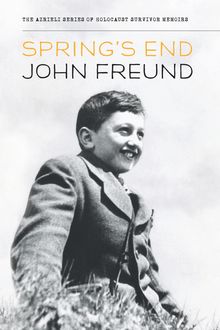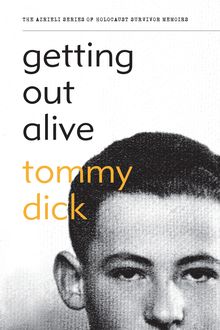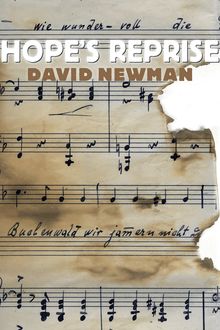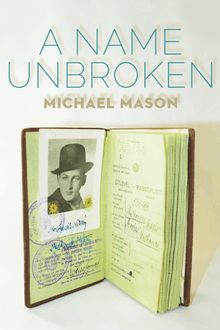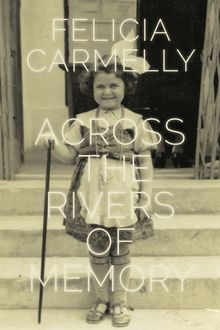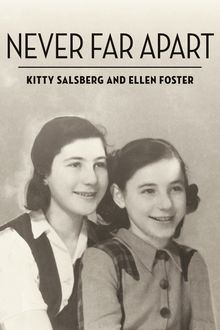-
 Univers
Univers
-
 Ebooks
Ebooks
-
 Livres audio
Livres audio
-
 Presse
Presse
-
 Podcasts
Podcasts
-
 BD
BD
-
 Documents
Documents
-
- Cours
- Révisions
- Ressources pédagogiques
- Sciences de l’éducation
- Manuels scolaires
- Langues
- Travaux de classe
- Annales de BEP
- Etudes supérieures
- Maternelle et primaire
- Fiches de lecture
- Orientation scolaire
- Méthodologie
- Corrigés de devoir
- Annales d’examens et concours
- Annales du bac
- Annales du brevet
- Rapports de stage
La lecture à portée de main
Vous pourrez modifier la taille du texte de cet ouvrage
Découvre YouScribe en t'inscrivant gratuitement
Je m'inscrisDécouvre YouScribe en t'inscrivant gratuitement
Je m'inscrisEn savoir plus
Vous pourrez modifier la taille du texte de cet ouvrage
En savoir plus

Description
Sujets
Informations
| Publié par | Azrieli Foundation |
| Date de parution | 01 septembre 2012 |
| Nombre de lectures | 0 |
| EAN13 | 9781897470695 |
| Langue | English |
| Poids de l'ouvrage | 1 Mo |
Informations légales : prix de location à la page 0,0300€. Cette information est donnée uniquement à titre indicatif conformément à la législation en vigueur.
Extrait
Knocking on Every Door
Anka Voticky
The Azrieli Series of Holocaust Survivor Memoirs
INTERNATIONAL ADVISORY COUNCIL
Doris Bergen, Chancellor Rose and Ray Wolfe Chair in Holocaust Studies, University of Toronto
Sara R. Horowitz, Director of the Israel and Golda Koschitzky Centre for Jewish Studies, York University
Nechama Tec, Professor Emerita of Sociology, University of Connecticut
Avner Shalev, Chairman of the Yad Vashem Directorate, Jerusalem
Naomi Azrieli, Publisher
Andrea Knight, Managing Editor
Arielle Berger, Assistant Editor
Mia Spiro, Associate Editor
Elizabeth Lasserre, Senior Editor, French-Language Editions
François Blanc, Editor, French-Language Editions, and Cartographer
Aurélien Bonin, Assistant Editor / Researcher, French-Language Editions
Elin Beaumont, Program Coordinator
Tim Mackay, Program Assistant
Susan Roitman, Executive Coordinator
Mark Goldstein, Art Director
Nicolas Côté, Layout, French-Language Editions
Contents
The Azrieli Series of Holocaust Survivor Memoirs
Series Preface: In their own words...
Introduction
Dedication
A Happy Beginning
The Gathering Storm
Searching for Shelter
Safe Haven in Shanghai
The War Reaches Us
The Pain of Knowing
Fleeing Yet Again
Emigrants Once More
Safe and Free
Epilogue
Glossary
Photographs
Copyright
About the Azrieli Foundation
Also Available
Series Preface: In their own words...
In telling these stories, the writers have liberated themselves. For so many years we did not speak about it, even when we became free people living in a free society. Now, when at last we are writing about what happened to us in this dark period of history, knowing that our stories will be read and live on, it is possible for us to feel truly free. These unique historical documents put a face on what was lost, and allow readers to grasp the enormity of what happened to six million Jews – one story at a time.
David J. Azrieli, C.M., C.Q., M.Arch Holocaust survivor and founder, The Azrieli Foundation
Since the end of World War II, over 30,000 Jewish Holocaust survivors have immigrated to Canada. Who they are, where they came from, what they experienced and how they built new lives for themselves and their families are important parts of our Canadian heritage. The Azrieli Foundation’s Holocaust Survivor Memoirs Program was established to preserve and share the memoirs written by those who survived the twentieth-century Nazi genocide of the Jews of Europe and later made their way to Canada. The program is guided by the conviction that each survivor of the Holocaust has a remarkable story to tell, and that such stories play an important role in education about tolerance and diversity.
Millions of individual stories are lost to us forever. By preserving the stories written by survivors and making them widely available to a broad audience, the Azrieli Series of Holocaust Survivor Memoirs seeks to sustain the memory of all those who perished at the hands of hatred, abetted by indifference and apathy. The personal accounts of those who survived against all odds are as different as the people who wrote them, but all demonstrate the courage, strength, wit and luck that it took to prevail and survive in such terrible adversity. The memoirs are also moving tributes to people – strangers and friends – who risked their lives to help others, and who, through acts of kindness and decency in the darkest of moments, frequently helped the persecuted maintain faith in humanity and courage to endure. These accounts offer inspiration to all, as does the survivors’ desire to share their experiences so that new generations can learn from them.
The Holocaust Survivor Memoirs Program collects, archives and publishes these distinctive records and the print editions are available free of charge to libraries, educational institutions and Holocaust-education programs across Canada, and to the general public at Azrieli Foundation educational events. Online editions of the books are available free of charge on our web site, www.azrielifoundation.org.
The Azrieli Foundation would like to express appreciation to the following people for their invaluable efforts in producing this series: Mary Arvanitakis, Josée Bégaud, Florence Buathier, Franklin Carter, Mark Celinscack, Darrel Dickson (Maracle Press), Andrea Geddes Poole, Sir Martin Gilbert, Pascale Goulias-Didiez, Stan Greenspan, Karen Helm, Carson Phillips, Pearl Saban, Jody Spiegel, Erika Tucker, Lise Viens, and Margie Wolfe and Emma Rodgers of Second Story Press.
Introduction
Prague, Shanghai, Montreal – these are the main stations of Anka Voticky’s extraordinary life journey. In this wise and brilliantly observed memoir, Anka recounts her experiences as a spunky child and pampered young woman in Central Europe, a stateless refugee in China under Japanese occupation, and a survivor of the Holocaust who made a home for herself and her family in post-war Canada. She has a distinctive style – open, direct and surprisingly witty – and a keen eye for those crucial moments that capture a world of meaning. Several threads connect the far-flung events she describes. Evident on every page is her devotion to others, above all her family. Viewed in contrast to her own fierce loyalty, the betrayals she endures are all the more devastating. Anka’s odyssey and the fates of her relatives and friends reveal the global reach of the Holocaust, a process of destruction that marked every Jew everywhere as a target for death and rendered every place in the world either a perilous trap or a possible haven. Another recurring theme in the memoir is memory itself. Anka’s phenomenal powers of recall make her account vivid and immediate, a gift for the reader. For Anka herself, however, that remarkable ability to remember brings some unbidden, all-too-real, and intensely painful re-appearances of the past.
Anka Kanturkova was born in 1913 in Brandýs nad Labem, a small town in the Austro-Hungarian Empire, just twenty-five kilometres from Prague. Her father, Max Kanturek, owned a men’s clothing store and, as was typical of middle-class households in Central Europe at that time, the family had a maid and a nanny. Anka was especially close to Fanda, the maid, a local Czech woman who lived and worked in the household for fourteen years, and Fanda is a significant presence throughout the book. Many memoirs of the period describe similar bonds between Jewish children and gentile maids or nannies. In Czechoslovakia and Poland, it was often those young Christian women who played key roles in sheltering Jewish children during the Holocaust. In some cases, of course, the opposite occurred, and gentiles who worked in Jewish homes turned against their employers, stealing their property and betraying them to the authorities. Fanda remained loyal to Anka and her family, despite the fact that her own father was suspicious of Jews and even believed the old lie that Jews used the blood of Christian children for ritual purposes.
In hindsight, it seems strange that intimate ties between Jews and gentiles could exist alongside such visceral antisemitism and ignorance, but this situation too was quite typical. By the time Anka was born in 1913, the approximately two million Jews living under Habsburg rule were an integral part of the economy and society of the multi-ethnic Austro-Hungarian Empire: 300,000 Jewish soldiers and tens of thousands of Jewish officers served the imperial cause in World War I . Yet antisemitism in all its forms was widespread: from old-fashioned religious anti-Judaism to political mobilization against Jewish emancipation to modern, secular racism. Pogroms – violent attacks on Jewish life and property – were not uncommon in periods of crisis, notably in the chaos at the end of World War I .
In 1918, Anka’s family moved to Prague, a decision she reports was motivated by her parents’ desire to get the best education for their children. No doubt that was true, but as is so often the case, individual and family decisions also reflected wider trends. The decades between 1890 and 1918 saw massive migration of Jews from the countryside and small towns into the major cities of Central Europe. This movement was part of a wider process of urbanization throughout Europe, although Jews were even more likely than non-Jews to participate. Cities provided economic, professional, educational and cultural opportunities; they also offered increased security (strength in numbers) and access to active Jewish communities. What could Brandýs, with its two hundred-odd Jews, offer compared to Prague, one of the great centres of Jewish life in Europe? In 1918, there were tens of thousands of Jews in Prague, including, most famously, Franz Kafka, whose father, like Anka’s, worked in textiles. In the following years, thousands more streamed in from small towns throughout Bohemia, so that by 1939, 20 per cent of the city’s population was Jewish.
By the time Anka was six years old, the Austro-Hungarian Empire had dissolved and Prague became the capital of the newly established Republic of Czechoslovakia. Its founder and first president was Tomáš Garrigue Masaryk, whose birthday, March 7, became a Czechoslovak national holiday. In 1944, Anka notes, the Germans in charge of Auschwitz “celebrated” that date by gassing almost 4,000 Czech Jews, including one of her cousins. Anka’s father, like many of his contemporaries, was a staunch Czech patriot who saw no contradiction between being Czech and being Jewish. Indeed, ethnic identities and linguistic and religious practices were qui
-
 Univers
Univers
-
 Ebooks
Ebooks
-
 Livres audio
Livres audio
-
 Presse
Presse
-
 Podcasts
Podcasts
-
 BD
BD
-
 Documents
Documents
-
Jeunesse
-
Littérature
-
Ressources professionnelles
-
Santé et bien-être
-
Savoirs
-
Education
-
Loisirs et hobbies
-
Art, musique et cinéma
-
Actualité et débat de société
-
Jeunesse
-
Littérature
-
Ressources professionnelles
-
Santé et bien-être
-
Savoirs
-
Education
-
Loisirs et hobbies
-
Art, musique et cinéma
-
Actualité et débat de société
-
Actualités
-
Lifestyle
-
Presse jeunesse
-
Presse professionnelle
-
Pratique
-
Presse sportive
-
Presse internationale
-
Culture & Médias
-
Action et Aventures
-
Science-fiction et Fantasy
-
Société
-
Jeunesse
-
Littérature
-
Ressources professionnelles
-
Santé et bien-être
-
Savoirs
-
Education
-
Loisirs et hobbies
-
Art, musique et cinéma
-
Actualité et débat de société
- Cours
- Révisions
- Ressources pédagogiques
- Sciences de l’éducation
- Manuels scolaires
- Langues
- Travaux de classe
- Annales de BEP
- Etudes supérieures
- Maternelle et primaire
- Fiches de lecture
- Orientation scolaire
- Méthodologie
- Corrigés de devoir
- Annales d’examens et concours
- Annales du bac
- Annales du brevet
- Rapports de stage
